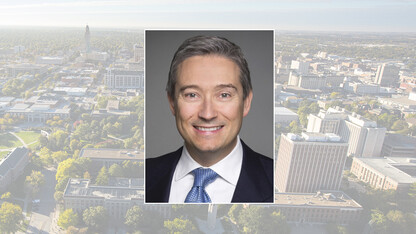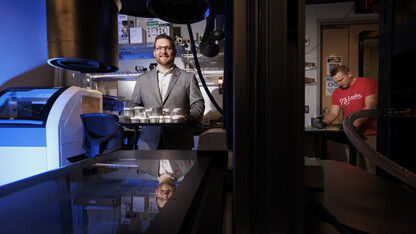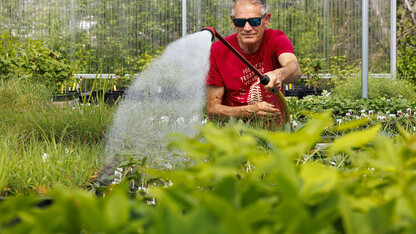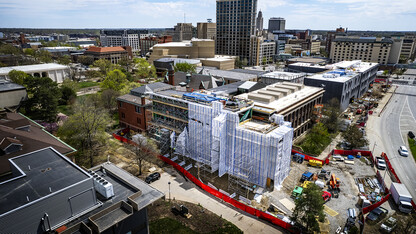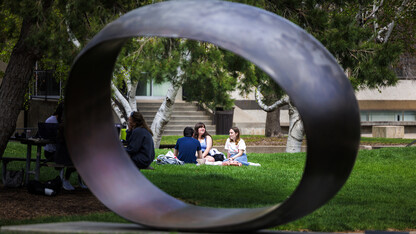· 5 min read
Nebraska Strong counselors continue outreach amid pandemic
A project that has acquainted thousands of Nebraskans with ways to deal with the stresses of the coronavirus pandemic will continue through the end of 2021.
The Nebraska Strong Recovery Project aims to connect people coping with disaster to crisis counseling services and other resources.
The Nebraska Department of Health and Human Services collaborates with the University of Nebraska Public Policy Center, the Nebraska Emergency Management Agency and the state’s six behavioral health regions on the Nebraska Strong Recovery Project. The Public Policy Center has taken on a prominent role in training Nebraska Strong staff, evaluating the impact of the program and providing technical assistance for all the partners.
The project’s extension opens the door to reaching more people as COVID-19 restrictions ease and communities stage the fairs, festivals, parades, farmers markets and other events that were put on hold last summer.
“We’ve still got some important work to do. Tensions are high,” said Ryan Ruff, a disaster outreach worker in northeast Nebraska’s Region 4 Behavioral Health System.
He is seeing Nebraskans experience anxiety, fear, grief and fatigue for a range of reasons — losing someone to COVID-19 or getting the virus, having schools and businesses disrupted, not knowing when the pandemic will be over and even the debate about whether to get vaccinated.
Don Lease, in the Panhandle’s Region 1, agrees that more outreach is needed, saying economic uncertainty lingers and unemployment remains an issue for some people. Outreach workers have been part of a food box program where cars circled the block, he said.
With more months to work, outreach teams are welcoming the chance to make plans to meet Nebraskans where they are, whether it’s at a mural painting in Chadron, the Swedish Festival in Stromsburg or a music festival in Wahoo.
Video and radio public service announcements highlighting the Nebraska Strong Recovery Project have begun airing around the state.
This fall, Region 4 is planning to have storytelling groups and possibly a nationally known singer/storyteller work with students to express what it was like to live through the pandemic. Students will be prompted to think of the silver linings or lessons learned, and the written or video results will be placed in time capsules to be kept by area museums or libraries, Ruff said.
Panhandle outreach workers plan to meet up with harvest truck drivers at elevators, one of the few places to catch widely dispersed farmers and ranchers, to share a bottle of water and a card about the project.
The project distributes a lot of printed materials, whether business cards, posters or brochures, that advertise the Nebraska Family Helpline (888-866-8660) and the Rural Response Hotline (1-800-464-0258).
Many of the regions distributed coloring pages through schools, day cares and public events. The pages include project information and “once a kid colors it, there’s a good chance it will be maintained by the household,” said Theresa Henning, of Region 5 in southeast Nebraska.
According to the Nebraska Department of Health and Human Services, outreach workers distributed nearly 478,000 pieces of project material for the entirety of the project through June 28, which is roughly one for every four people in the state.
The project, which originally formed after the state’s 2019 flooding, in 2020 received $6.7 million in new federal grants to focus on COVID-19. The project was scheduled to end June 26, but was authorized for six more months of outreach across all 93 counties.
About 70% of the outreach workers’ contacts with Nebraskans are brief conversations, with the rest involving longer engagement and possibly referrals for help from mental health professionals, Henning said.
With COVID-19 case rates down and vaccination rates up, the next phase will feature more door-to-door contacts as well as many more community events, Henning said. Visits to nursing facilities for games or crafts will continue — news that prompted one resident to cry when she heard the team would be back. And people who may not have felt safe going to a coffee shop meet-up now may, she said.
In many cases, outreach workers have drawn on their own skills and hobbies to create ways to interact with the public. An outreach worker who is a retired art teacher has held “Bob Ross style” painting classes.
“While you’re shading in something for three to five minutes, people talk,” Ruff said, allowing people to express what they’re experiencing.
A common theme in outreach workers’ interactions is the need to pay attention to self-care. Often, Lease said, just talking about stress will lead the person to identify a solution on their own, such as adding exercise to their daily routine.
Lease said he believes the Nebraska Strong Recovery Project has done a good job of spreading awareness that help is available, and that will just grow in the next six months.
“What will be our legacy?” Lease said. “I hope it’s that people will be less afraid to take advantage of behavioral health services and mental health care. No stigma.”

